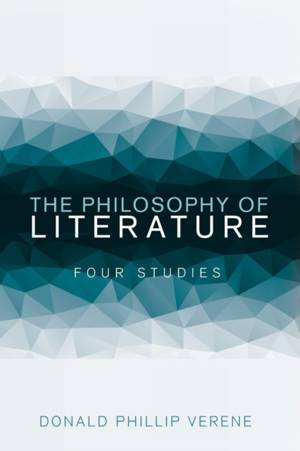
Door een staking bij bpost kan je online bestelling op dit moment iets langer onderweg zijn dan voorzien. Dringend iets nodig? Onze winkels ontvangen jou met open armen!
- Afhalen na 1 uur in een winkel met voorraad
- Gratis thuislevering in België vanaf € 30
- Ruim aanbod met 7 miljoen producten
Door een staking bij bpost kan je online bestelling op dit moment iets langer onderweg zijn dan voorzien. Dringend iets nodig? Onze winkels ontvangen jou met open armen!
- Afhalen na 1 uur in een winkel met voorraad
- Gratis thuislevering in België vanaf € 30
- Ruim aanbod met 7 miljoen producten
Zoeken
€ 30,95
+ 61 punten
Uitvoering
Omschrijving
The Philosophy of Literature: Four Studies puts forth the question of the extent to which philosophers must go to school with the poets. It begins with a new interpretation of the famous Platonic quarrel with the poetic wisdom of Homer. It brings this question forward through the humanism of thinkers of the Italian Renaissance and the German Idealism of Hegel. It then treats the relation of philosophy and literature in four ways by considering philosophy as literature, philosophy of literature, philosophy in literature, and philosophy and literature. In regard to the first of these, it discusses Jorge Luis Borges's The Immortal, to the second James Joyce's Finnegans Wake, to the third Carl Sandburg's epic prose poem The People, Yes, and to the fourth, Sebastian Brant's Ship of Fools. This work demonstrates that in an area of thought often dominated by fashionable doctrines of literary interpretation, the great works of literature and philosophy remain as permanent residents of our thought and imagination.
Specificaties
Betrokkenen
- Auteur(s):
- Uitgeverij:
Inhoud
- Aantal bladzijden:
- 150
- Taal:
- Engels
Eigenschappen
- Productcode (EAN):
- 9781532641732
- Verschijningsdatum:
- 12/09/2018
- Uitvoering:
- Paperback
- Formaat:
- Trade paperback (VS)
- Afmetingen:
- 152 mm x 226 mm
- Gewicht:
- 226 g

Alleen bij Standaard Boekhandel
+ 61 punten op je klantenkaart van Standaard Boekhandel
Beoordelingen
We publiceren alleen reviews die voldoen aan de voorwaarden voor reviews. Bekijk onze voorwaarden voor reviews.











